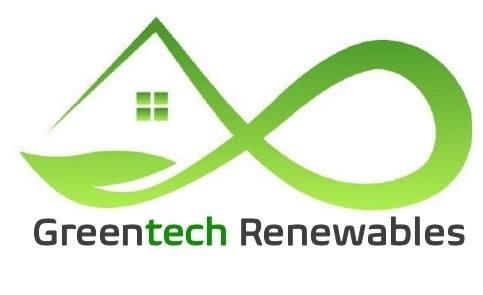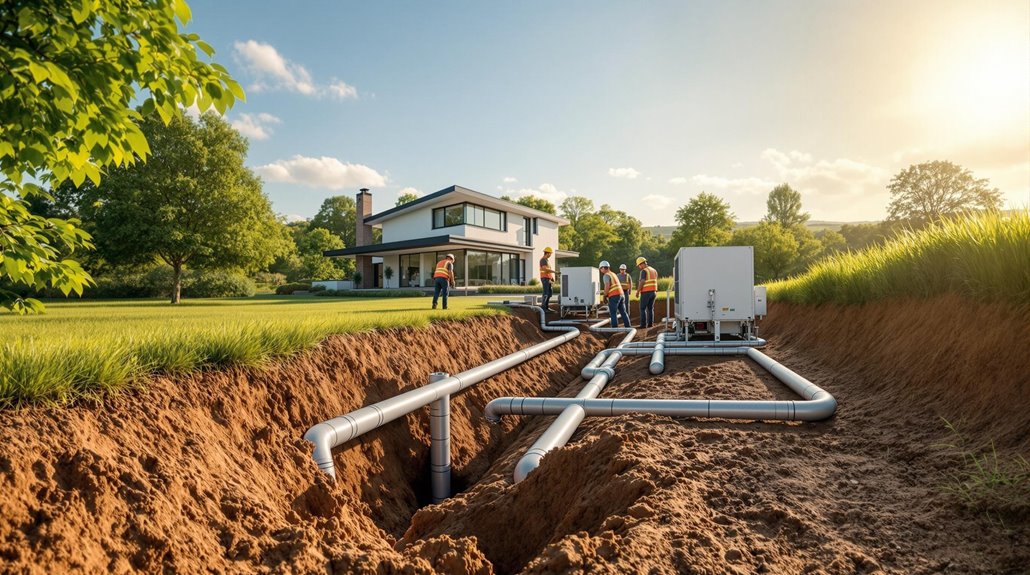Installing a ground source heat pump (GSHP) typically costs between £16,200 and £49,000, influenced by factors such as system type, property characteristics, and installation specifics. Horizontal systems generally range from £16,200 to £31,000 due to shallow trenching, while vertical systems, requiring deep drilling, can cost between £23,200 and £49,000. Equipment expenses account for nearly half of the total cost, with groundwork and drilling comprising over half of non-equipment expenses. Although initial costs are substantial, GSHPs offer lower long-term operational expenses, savings, and environmental benefits, enhanced by potential government grants and incentives. Exploring further can provide profound insights into material choices and financial planning.
Cost Breakdown of GSHPs
Understanding the cost breakdown of ground source heat pumps (GSHPs) is vital when considering their installation. The total installation cost varies markedly, ranging from £16,200 to £49,000. This variance largely depends on the system type and installation complexity. Equipment costs make up 49% of the total, with smaller systems incurring higher costs per kW compared to larger ones. Non-equipment costs, which include drilling and groundwork, account for approximately 51% of the total costs. It's important to bear in mind that a considerable portion, around 60%, of these non-equipment costs is attributed to drilling and groundwork.
When you're evaluating the cost, it's essential to understand that GSHPs can be more cost-effective in the long term. The average annual running cost of a GSHP is about £1,020. This is lower than the £1,135 for air source heat pumps, but slightly higher than the £875 for gas boilers. While the upfront investment may seem substantial, the lower running costs can offer savings over time. By taking a detailed look at these cost structures, you can make a more informed decision about whether a GSHP aligns with your financial and energy efficiency goals.
Vertical vs. Horizontal Systems
When deciding between vertical and horizontal ground source heat pumps (GSHPs), the system's cost and land availability are critical factors to evaluate. Vertical GSHPs, costing between £23,200 and £49,000, involve deep drilling to depths of 50-100 meters. This option suits properties with limited land because it requires less surface area, making it ideal for urban environments or smaller lots. Despite the higher initial cost, the smaller footprint could be the determining factor if space is at a premium.
Alternatively, horizontal GSHPs are more affordable, ranging from £16,200 to £31,000, as they involve shallow trenching, usually 1-2 meters deep. These systems are often chosen in rural areas where land is plentiful, as they require more extensive ground space for installation. If you have ample land available, a horizontal system might be more cost-effective and simpler to install.
Both systems provide efficient heating and cooling, but your choice will largely depend on your specific circumstances. Consider your property's size and budget when making this decision. The installation costs will vary, influenced by the complexity and design of the system you choose, but both options offer long-term energy efficiency benefits.
Factors Influencing Installation Cost
Several factors influence the installation cost of ground source heat pumps (GSHPs), making it essential to evaluate each one carefully. To begin with, the type of system you choose—vertical or horizontal—significantly affects costs. Vertical systems, ranging from £23,200 to £49,000, generally cost more due to deeper drilling requirements, whereas horizontal systems typically range from £16,200 to £31,000. These variations highlight the importance of considering your location and available land when selecting a system.
Another important factor is the size and design of your GSHP system. The system must match your household's heating needs, as higher heat demand necessitates a larger capacity, increasing installation costs. It's important to analyze your heating requirements to determine the appropriate system size.
Additionally, the coefficient of performance (COP) of the heat pump impacts costs. A higher COP indicates better efficiency, potentially reducing long-term running costs despite a possibly higher initial investment. Finally, rural locations often opt for horizontal installations due to land availability, while larger systems, like 600kW models, incur higher per kW costs compared to smaller ones such as 12kW systems, due to increased complexity.
Equipment and Groundwork Expenses
The cost of installing a ground source heat pump (GSHP) largely hinges on equipment and groundwork expenses. Equipment costs constitute about 49% of the total installation price, making them a substantial part of your investment. Groundwork, particularly the drilling required for vertical systems, plays an important role in these expenses. Vertical installations, requiring deep drilling between 50-100 meters, cost anywhere from £23,200 to £49,000. Horizontal systems, which involve digging shallower trenches of 1-2 meters, are somewhat less expensive, ranging from £16,200 to £31,000.
Groundwork and drilling can account for approximately 60% of non-equipment costs, highlighting their importance in the overall pricing structure. The type of GSHP system you choose, whether vertical or horizontal, will greatly impact these costs. Additionally, the size of the system influences the cost per kilowatt. Smaller systems, such as those around 12kW, tend to have higher costs per kilowatt compared to larger systems, like 600kW installations. This means that while smaller systems might seem initially less expensive, the cost efficiency per kilowatt may be lower, necessitating careful consideration of your specific heating needs and budget.
Comparing GSHP Running Costs
Exploring the running costs of a ground source heat pump (GSHP) reveals its potential for long-term savings. On average, you might spend about £1,020 annually to operate a GSHP, making it more economical than air source heat pumps, which cost around £1,135, but slightly more than gas boilers at £875. However, the efficiency of a GSHP, reflected in its Coefficient of Performance (COP) of 4.5, means it generates four to five units of heat per unit of electricity used, offering significant energy efficiency.
The system size affects costs; smaller GSHPs typically incur higher costs per kilowatt than larger systems. Additionally, the source temperature plays a vital role. Lower ground temperatures might lead to increased costs, while higher temperatures can enhance efficiency, reducing expenses. Consequently, understanding your local ground conditions is essential for optimizing performance.
Transitioning from a gas boiler to a GSHP can potentially save you up to £545 annually. While initial costs might be higher, the long-term operational savings and improved energy efficiency make GSHPs an attractive option for reducing your carbon footprint and controlling energy expenses effectively.
Financial Incentives and Savings
Investing in a ground source heat pump (GSHP) becomes more attractive with the financial incentives available. The Boiler Upgrade Scheme offers a substantial grant of £7,500, considerably easing the initial investment burden, which typically ranges from £16,200 to £49,000. This incentive effectively reduces the upfront costs, making the shift to a more sustainable heating solution financially feasible.
In addition to the grant, switching from a gas boiler to a GSHP can result in annual savings of up to £545. These savings underscore the long-term financial benefits of adopting GSHPs. While the average running cost for a GSHP is approximately £1,020 per year, it remains competitive when compared to air source heat pumps and gas boilers. Although slightly higher than gas boilers, GSHPs offer other advantages, such as increased efficiency and reduced carbon emissions.
Moreover, various government schemes provide additional support, enhancing the financial appeal of GSHPs. The combination of grants and potential savings illustrates a compelling economic case for homeowners considering this renewable energy system. Ultimately, the financial incentives and reduced operating costs contribute to making GSHPs an attractive and viable long-term investment.
Government Grants and Schemes
While financial incentives make ground source heat pumps (GSHPs) more appealing, government grants and schemes play a notable role in offsetting high installation costs. The Boiler Upgrade Scheme (BUS) is a primary example, offering a £7,500 grant to encourage the shift from fossil fuel systems to low-carbon heating solutions. This substantial grant is available for properties in England and Wales that possess a valid Energy Performance Certificate (EPC), ensuring that only eligible homes benefit from this financial support.
To qualify for the BUS, your installation must be a new system replacing an existing fossil fuel setup and adhere to Microgeneration Certification Scheme (MCS) standards. Certified installers manage the grant application process, streamlining it for you, and ensuring compliance with the necessary requirements. This not only simplifies your experience but also promotes an efficient move to sustainable energy solutions.
Additionally, other government schemes like ECO4 may be available, further reducing your installation costs. These programs are designed to support the adoption of renewable energy systems, making GSHPs more financially viable. By taking advantage of these grants and schemes, you can greatly lower the upfront costs of installing a GSHP and contribute to a more sustainable future.
Selecting the Right Installer
Choosing the right installer for your ground source heat pump is fundamental to guarantee a smooth and successful installation. Start by verifying the installer is MCS certified, as this certification guarantees they meet industry standards and make you eligible for government grants. This is a pivotal step in maintaining quality and compliance.
Next, obtain multiple quotes from different installers. This approach not only helps you secure fair pricing but also guarantees quality service. Platforms like GreenMatch can provide free quotes and connect you with local installers, making the search process more manageable. Look for detailed proposals that outline costs, timelines, and installation specifics. These details aid in making informed decisions and comparing options effectively.
Furthermore, investigate the installer's qualifications, customer reviews, and previous installation experience. This research is fundamental for guaranteeing a reliable and effective installation process. It's important that they have a proven track record in ground source heat pump installations. Finally, a professional assessment by the installer can determine the system's suitability for your property, guaranteeing it meets your heating needs efficiently. This assessment is a significant step in confirming that the installation will be successful and beneficial for your home.
Benefits of Ground Source Heat Pumps
After selecting the right installer, you'll start reaping the benefits of ground source heat pumps. These systems substantially reduce reliance on fossil fuels, leading to lower carbon emissions and promoting environmental sustainability. By choosing a ground source heat pump (GSHP), you're contributing to a cleaner planet, as these pumps utilize the earth's consistent underground temperature for heating and cooling, rather than burning fossil fuels.
In terms of financial advantages, GSHPs offer long-term energy savings. With average operating costs around £1,020 per year, they're more economical than air source heat pumps (£1,135) and comparable to gas boilers (£875). Despite the initial installation costs, the typical payback period is about 4-5 years, making them a cost-effective choice in the long run. Additionally, a GSHP can enhance your property value through sustainable upgrades, appealing to environmentally-conscious buyers.
Efficiency is another major benefit, with a high coefficient of performance (COP) of approximately 4.5. This indicates superior efficiency compared to traditional gas boilers, which have an ErP rating of 92%. In addition, GSHPs have a long lifespan and require minimal maintenance, ensuring ongoing reliability and reducing future expenses.


